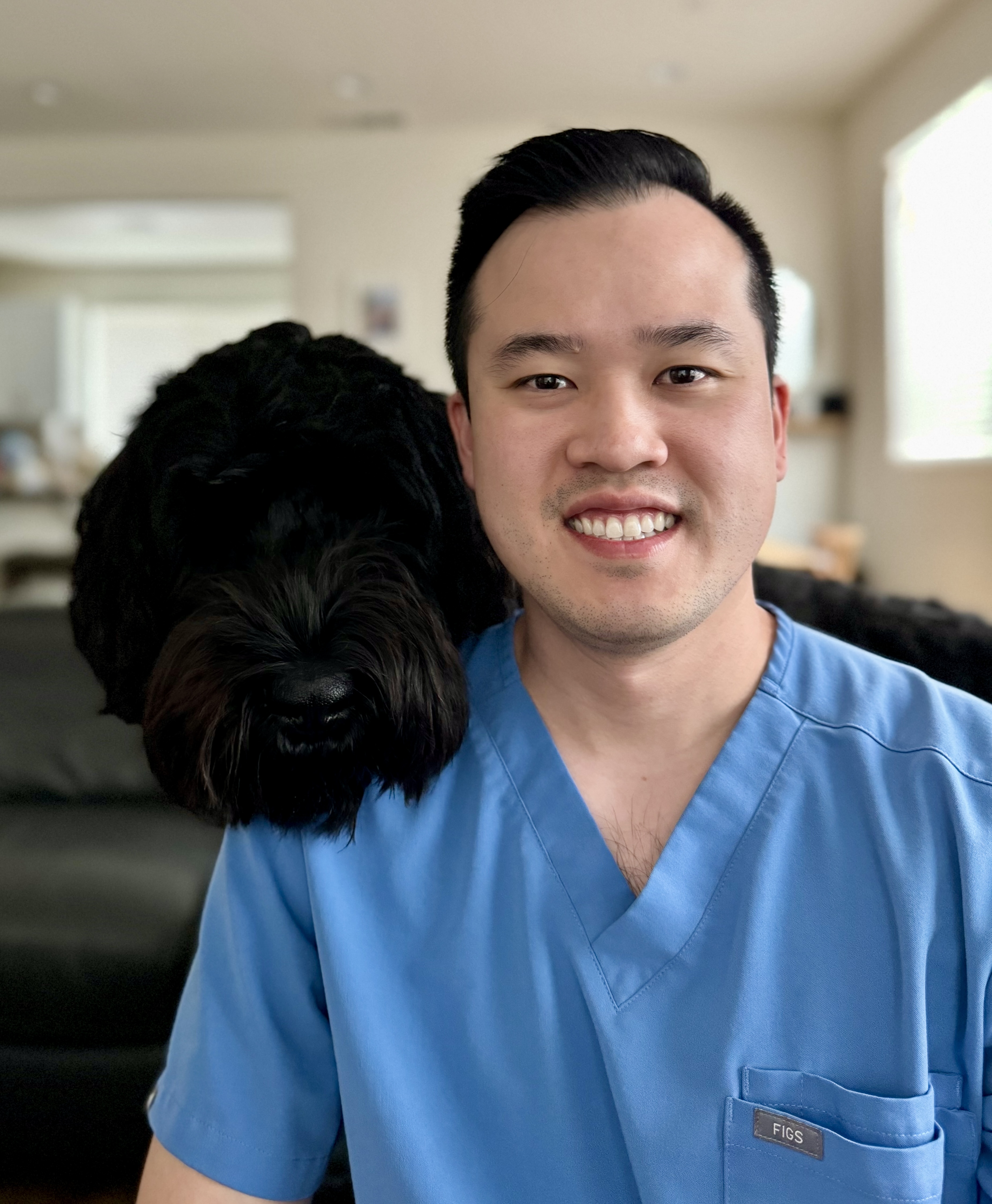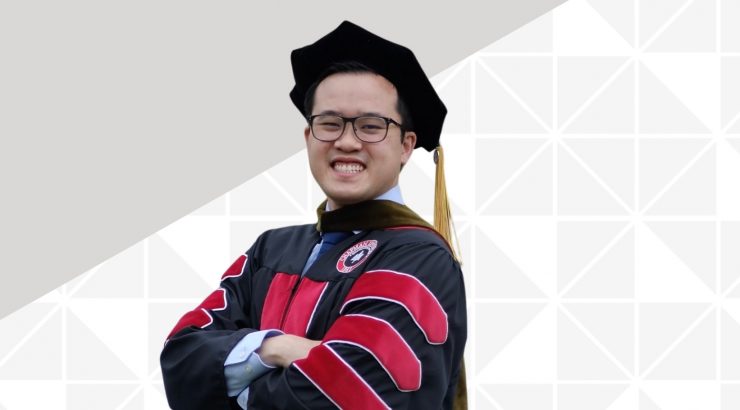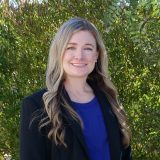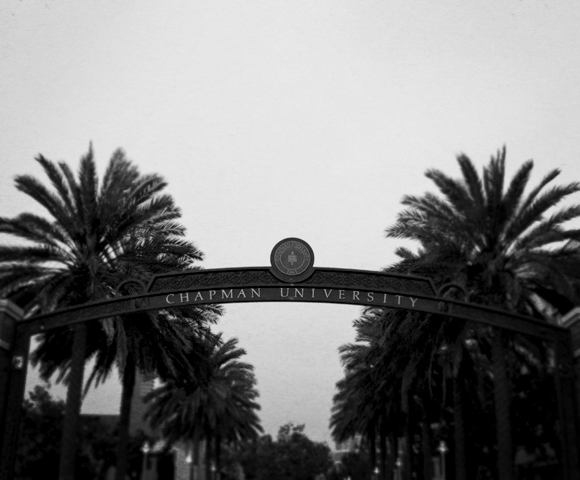Helping Families in Vulnerable Moments: Dustin Le’s (PharmD, ‘20) Path to a Fulfilling Career in Pharmacy
November 22, 2024
 Dustin Le, who is now a Pediatric Emergency Medicine Pharmacist at the Children’s Hospital of Orange County (CHOC), earned his Doctorate of Pharmacy (PharmD) at CUSP. While at CUSP, Dustin participated in student leadership, research projects, and elective courses that directly prepared him for his future career. At CHOC, Dustin works in a 44-bed emergency department and Level 1 Trauma Center, which handles over 100,000 visits annually. We asked him some questions to get a sense of what his time at Chapman was like and how it prepared him for his exciting and invaluable work at CHOC.
Dustin Le, who is now a Pediatric Emergency Medicine Pharmacist at the Children’s Hospital of Orange County (CHOC), earned his Doctorate of Pharmacy (PharmD) at CUSP. While at CUSP, Dustin participated in student leadership, research projects, and elective courses that directly prepared him for his future career. At CHOC, Dustin works in a 44-bed emergency department and Level 1 Trauma Center, which handles over 100,000 visits annually. We asked him some questions to get a sense of what his time at Chapman was like and how it prepared him for his exciting and invaluable work at CHOC.
Were there any student organizations you were part of at CUSP that helped shape your career?
Serving as president of Chapman’s student chapter of the California Society of Hospital Pharmacists (CSHP) was a defining experience that shaped my pharmacy career. Dr. Jerika Lam’s mentorship was invaluable as she guided me in student leadership and helped me develop skills in teamwork, communication, and networking that still benefit me today. Leading projects like Kaiser’s Networking Night, the Industry Speakers’ Forum, and residency prep workshops allowed me to work closely with peers and industry professionals, preparing me for the diverse challenges in pharmacy. Our chapter’s success in awards like the CSHP Quiz Bowl and Music Video Competition further enriched my leadership experience, while community outreach initiatives deepened my commitment to patient care and advocacy. Dr. Jerika Lam’s guidance, combined with these experiences, gave me the confidence, connections, and skill set that have been foundational to my growth in pharmacy.
Were you part of any research at CUSP? What was that like? 
I was actively involved in research at CUSP, which provided invaluable opportunities for growth and practical impact. A highlight was working with faculty members like Dr. Coco Yang and others on oral anticancer chemotherapy research. Our main objective was to promote the adoption of a hazardous symbol on oral chemotherapy drugs to ensure easy identification by professionals and community partners. This symbol would also serve to educate patients and caregivers on the critical need for safe handling and disposal, helping to reduce cross-contamination risks at home and in public spaces. One of the most impactful moments was presenting our findings to the Board of Pharmacy in Sacramento, advocating directly for this policy change. I also had the chance to share our research at conferences nationwide, connecting with other professionals and broadening my perspective on pharmacy practice. This experience deepened my knowledge and reinforced my commitment to enhancing patient safety in pharmacy.
How did you find pharmacy as a career route?
I discovered my path to pharmacy through a combination of academic curiosity and practical experience. It started with a neuropharmacology course in undergrad, where I became fascinated by how drugs interact with neurotransmitters. Wanting to explore pharmacy as a career, I became a pharmacy technician to gain hands-on experience and see if it was the right fit. As a technician, I worked in compounding and retail pharmacy and had the opportunity to shadow pharmacists. Observing their interactions with patients and providers showed me the depth of their expertise and impact. I enjoyed connecting with patients and applying healthcare knowledge, and this blend of science and patient care confirmed that pharmacy was the right career for me.
 How do you feel like being bilingual is an asset to you at work?
How do you feel like being bilingual is an asset to you at work?
Being bilingual in Vietnamese is a valuable asset in Orange County’s diverse community. Many of our patients and their families are more comfortable communicating in their native language, so being able to speak Vietnamese allows me to connect with them on a deeper level. It allows me to assist with patient education during discharge, ensuring Vietnamese-speaking families fully understand their medications and care instructions.
In what ways did Chapman set you up for your future? Was there a certain faculty, class, or experience that stands out to you?
Chapman’s pharmacy program set me up for success in profound ways, especially by preparing me for board licensing exams and providing a solid clinical foundation. Every professor and course contributed to my professional growth, but one elective stands out: Emergency Medicine with Dr. Kimberly Won and Dr. Laura Tsu. Partnering with the physician assistant program, this course included advanced mannequin simulations, real hospital equipment, and rich interprofessional collaboration, immersing us in high-stakes, real-world scenarios that were invaluable for hands-on learning. These emergency code simulations did more than test my knowledge—they ignited my passion for acute care. Reflecting on my journey, I realize the practical skills, situational awareness, and confidence I gained at Chapman have been essential to my success as an emergency medicine pharmacist.
Did you feel immediately prepared for the working world after you got your PharmD?
I felt well-prepared for the working world after earning my PharmD, thanks to the range of opportunities Chapman’s School of Pharmacy offered. Leadership roles in student organizations, along with research projects and poster presentations, helped me build confidence and essential skills for a real-world pharmacy setting. Additionally, mentoring experiences allowed me to refine my clinical knowledge and communication skills, both of which were invaluable in my transition to practice. These experiences directly contributed to my successful match with a PGY-1 residency program, where I could immediately apply the skills and knowledge I gained at Chapman. The combination of academic preparation, practical experience, and leadership development made me feel equipped to step into my professional role with confidence.
What is it like working as an emergency medicine pharmacist? Is it exciting? Stressful? What does a typical day at work look like for you?
Working as an emergency medicine pharmacist in a Level 1 trauma pediatric emergency department is high-stakes, high-adrenaline, and incredibly rewarding. Each day, I handle complex, patient-specific cases, with every medication dose precisely tailored to a child’s weight. In trauma and resuscitation scenarios, my role is essential—rapidly preparing and verifying life-saving medications alongside the ED team, where every second counts. Level 1 trauma center brings added intensity as we handle some of the most severe and urgent cases. Beyond patient care, I lead the ED pharmacy department and precept pharmacy residents and APPE students. The strong rapport I’ve built with the ED team allows for impactful, autonomous decision-making on the spot. While demanding, this role offers the unique reward of supporting young patients in their most vulnerable moments.
Interested in earning your PharmD with CUSP? Click here to learn more.
This article was written by Silas Fernandes.


